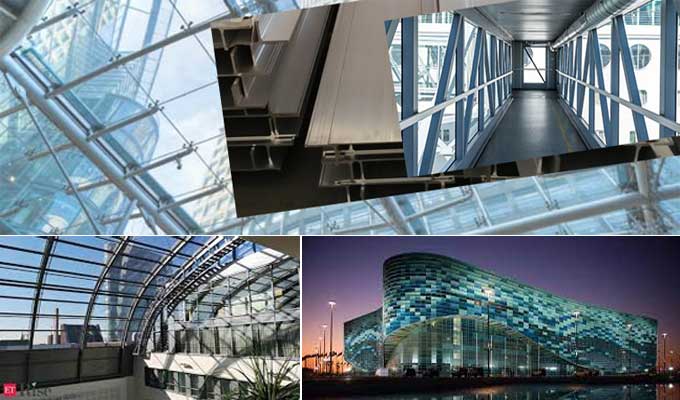
Utilization and Valuation of Aluminum as a Building Material

Aluminum was discovered about 200 years ago. It has become a viable building material since its discovery. Aluminum alloys became widely accepted as structural materials following technological advancements. It widely a use in commercial sectors as it considers the second-best choice after steel. Here are some of the ways it can use in the modern building industry.
Valuation of Aluminum in Construction
Aluminum has the advantage of being lightweight while strong. In the construction industry, this is a very valuable property. Aluminum is a very strong material, so it can handle the weight of glass spans, which is very important in building skyscrapers and offices.
Glass allows more light into a building, and who doesn't like working outside? With this ability, Glass can use in more ways.
The Ratio of Aluminum in alloys in Building Construction
Compared to alloyed aluminum, alumina is relatively weak. Due to this, Aluminum alloys improve their strength for use in extrusions and other manufactured components. Heavy alloyed Aluminum still has 92% purity.
The designer offers a variety of qualities when searching for an Aluminum alloy, such as high strength, low density, high-temperature resistance, and better forming and connecting abilities. A 6000 series alloy is a good choice for extrusion, but it is important to make sure what the purpose of the extrusion is.
Benefits of Using Aluminum in Building Construction
Alloys
Pure aluminum is a low-strength metal, it is ineffective for building, but alloy elements such as copper, silicon, and magnesium have the potential to be useful. A metal's strength increases when it alloys. It changes an element's mechanical and physical properties to obtain its desired properties.
Air Tightness
The second benefit of aluminum is its air-tightness. When window frames make from aluminum, they offer air-tightness, so you will not be bothered with air leaks. If aluminum window frames use, cracked frames will no issue at all.
Durability
Water and corrosion resistance, as well as high resistance, to UV rays are the benefits of these products.
Strength
The benefits of aluminum over other metals include its lightweight nature and strength, making it a very useful metal in the construction industry.
Heavy metals are not necessary when lightweight metals can provide you with equal strength. Aluminum will give your product structural strength instead of being low-quality.
Corrosive Resistance
This natural coating makes aluminum corrosion-resistant. When aluminum is naturally oxidized, then a thin layer of natural coating forms on top. It acts as a corrosion barrier. Furthermore, anodizing and painting add another layer of protection and help to prevent corrosion.
Thermal Efficiency
Heat and electricity conduct well through it. It still provides the same level of electrical resistance as copper, despite having half the weight. Power lines favor it over copper. Also, it uses extensively in heat sinks due to its conductivity.
Flexibility
Decorative purposes may require finishing the aluminum's surface after polishing. A pre-treatment enhances the material's corrosion resistance and ensures smoothness. Two of the most common ways to finish a surface are anodizing and painting.
Recycle Features of Aluminum
Metals such as aluminum are 100% recyclable. They do not lose any of their properties during the process. Recycling metals during production is more cost-effective than using metals extracted directly from the ground.
Due to the preference for deconstruction over demolition, the reusability of aluminum is an extremely important factor in the construction market. When possible, deconstruction should select because using recycled metal reduces landfill costs, cuts cost associated with metal extraction, and reduces environmental damage.
Less Smell & Impermeable
The most common way to use aluminum as a decor element is to paint it any color after polishing. Corrosion resistance is also available for aluminum.
Finishing
Aluminum is widely accepted as a decor material because it can be dyed any color after it has been polished. Corrosion-resistant aluminum treatments are also available.
To learn more, watch the following video tutorial.
Video Source: IESL_ Media
Uses of Aluminum
Architectural hardware, architectural plastics, hardware for H&V, shop fittings, and partitions are among the many uses of aluminum. In addition, scaffolding and plants are also common uses.
As a structural material, aluminum considers being the second-best choice after steel. Construction businesses and home builders routinely use aluminum. Approximately 40% of all aluminum produced in the United Kingdom is used in construction every year. There are roughly 150'000 tones of aluminum extrusion made every year; 65'000 tons used in extrusion; 25'000 tons used in the manufacture of sheet metal.
Wrapping it Up
Alloyed aluminum's benefits in construction have been studied. Furthermore, all polishing materials and treatment materials are neutral. Aluminum is quite a versatile metal that can use when creating construction items, extruding metal, and decorating metal.
Technically speaking, Aluminum offers endless possibilities to the building industry, as it contains very valuable properties. As such, there is no doubt that Aluminium has endless potential in the construction industry.


